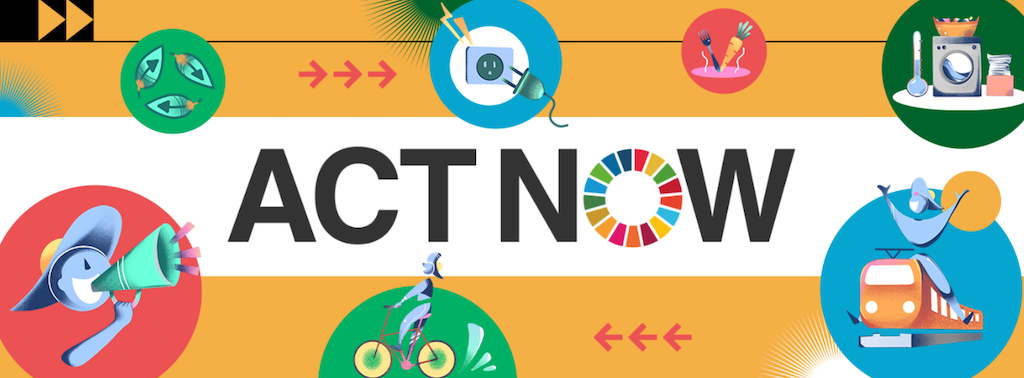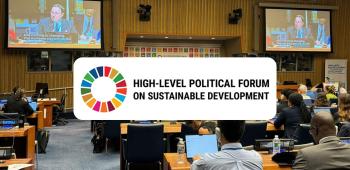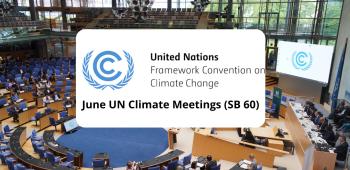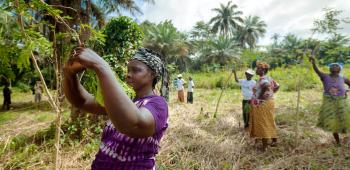Climate Action and Synergies
Description
The science is clear: our climate is heating rapidly. The average global temperatures have increased by 1.2 degrees Celsius since 1880, particularly in the late 20th century. The concentration of atmospheric CO2, the GHG that contributes more than 2/3 to global warming, is at its highest level ever. The Intergovernmental Panel on Climate Change (IPCC) steadily points out that human activities have warmed the atmosphere, ocean and land, producing widespread and rapid changes in the atmosphere, ocean, cryosphere and biosphere. Due to these changes in climate, the number of weather, climate and water-related disasters has increased by a factor of five over the past 50 years, causing over 2 million deaths and US$3.64 trillion in losses.
According to IPCC, warming beyond 1.5 degrees could have irreversible and irreparable consequences. However, effective and equitable adaptation and mitigation actions can significantly reduce vulnerability and contribute to climate resilience. To limit global warming to well below 2, preferably 1.5 degrees Celsius, compared to pre-industrial levels, countries came together to hold themselves accountable under the Paris Agreement. The agreement is a milestone of international cooperation to tackle climate change – first legally binding document in the history of climate action.
To move fast in the race against climate crisis, targeted actions that bring tangible benefits and limit the trade-offs on multiple fronts, are key for common success against climate change. The 2030 Agenda and the Sustainable Development Goals (SDGs), the world’s plan of action to achieving sustainability and resilience for people and planet, are closely linked with climate. Maximizing on the interlinkages between the 2030 Agenda and the Paris Agreement by leveraging Climate and SDG Synergies, has the potential of achieving both agendas and guaranteeing a livable future for next generations by leaving no one behind. In fact, progress made towards limiting global temperature increase would significantly ease the path to many other SDGs, such as those related to poverty, hunger, access to water, and terrestrial and marine ecosystems. Many of the SDGs and their targets can also be achieved in ways that would enable adaptive responses to climate change, for example those related to resilience in SDGs 9 and 11, respectively relating to infrastructure and urban settlements.
UN DESA is moving the needle forward for harnessing synergies across development and climate action. Through its support to various intergovernmental processes and fora, UN DESA is working to improve coordination with other entities by using the 2030 Agenda as both a framework and guiding principles.
CLIMATE ACTION STARTING NOW

Everyone has a role in climate action. At the United Nations, we are calling on people everywhere to work together to solve climate challenges and realize the commitments of the 2015 Paris Agreement. Learn more on UN Climate Action, including Secretary-General’s key statements on climate change, Climate Fast Facts, ActNow - the United Nations campaign for individual action, and much more.
Pagination
| Title | Category | Date Sort ascending |
|---|---|---|
| Trinidad and Tobago | Interactive Dialogue 4: Protecting our planet and combating climate change | 27-Sep-2015 |
| Uruguay | Interactive Dialogue 4: Protecting our planet and combating climate change | 27-Sep-2015 |
| Joint statement on Climate Change | Major Groups | 20-Jul-2015 |
| Major Groups: NGOs, Children & Youth and Women; Beyond 2015; Climate Action Network… | Co-chairs' meetings with Major Groups | 19-Jun-2014 |
| Global Foundation for Democracy and Development (GFDD) | Co-chairs' meetings with Major Groups | 19-Jun-2014 |
| Australia, The Netherlands and United Kingdom | Sustainable Consumption and Production; Climate change | 8-May-2014 |
| Solomon Islands | Sustainable Consumption and Production; Climate change | 8-May-2014 |
| Sweden | Sustainable Consumption and Production; Climate change | 8-May-2014 |
| Ethiopia | Sustainable Consumption and Production; Climate change | 7-May-2014 |
| Maldives | Sustainable Consumption and Production; Climate change | 7-May-2014 |
| Canada, Israel and United States of America | Sustainable Consumption and Production; Climate change | 7-May-2014 |
| South Africa | Sustainable Consumption and Production; Climate change | 7-May-2014 |
| Cyprus, Singapore and United Arab Emirates | Sustainable Consumption and Production; Climate change | 7-May-2014 |
| Iran | Sustainable Consumption and Production; Climate change | 7-May-2014 |
| Landlocked Developing Countries | Sustainable Consumption and Production; Climate change | 7-May-2014 |
Pagination
Milestones
-
January 2007 IPCC 4th Assessment ReportEstablished by UNEP and WMO as a scientific body under the auspices of the UN in 1988, the Intergovernmental Panel on Climate Change (IPCC) is the leading international body for the assessment of climate change. At the core of its mission there is the review and assessment of the most recent scientific, technical and socio-economic information produced worldwide and relevant to the understanding of climate change. The 2007 Intergovernmental Panel on Climate Change (IPCC) Fourth Assessment Report, in particular, warned of changing weather patterns and rising sea levels due to accelerating GHG emissions from human activities.
-
January 2005 Kyoto ProtocolAdopted in 1997, but entered into force only in 2005, the Kyoto Protocol commits industrialized countries to stabilize greenhouse gas emissions based on the principles of the Convention, sets binding emission reduction targets for 37 industrialized countries and the European community in its first commitment period. Overall, these targets add up to an average five per cent emissions reduction compared to 1990 levels over the five-year period 2008 to 2012 (the first commitment period). The Protocol is binding only for developed countries since it identifies them as largely responsible for the current high levels of GHG emissions in the atmosphere. Furthermore, the Protocol places a heavier burden on developed nations under its central principle of the “common but differentiated responsibility”. The Second Commitment Period was inaugurated on 1st January 2013, after the Doha amendment to the Protocol adopted in Doha in December 2012 and will be running until 2020.
-
January 1994 UNFCCCThe United Nations Framework Convention on Climate Change was signed in 1992 with the aim of limiting average global temperature increases and the resulting climate change as well as coping with whatever impacts were, by then, inevitable. New negotiations were launched for strengthening the global response to climate change, when countries realized in 1995 that the provisions adopted in the Convention for emission reductions were too weak. From the new round of negotiations, the Kyoto Protocol was formulated.
-
January 1992 Agenda 21 - Climate ChangeAgenda 21 stresses, in many sections, the concern about climate change and the different areas affected by this phenomenon. As pointed out in Paragraph 9.6. "Concern about climate change and climate variability, air pollution and ozone depletion has created new demands for scientific, economic and social information to reduce the remaining uncertainties in these fields. Better understanding and prediction of the various properties of the atmosphere and of the affected ecosystems, as well as health impacts and their interactions with socio-economic factors, are needed". The Agenda also takes into consideration climate change in the framework of the management of the marine environment and climate change (17.1e), of the sustainable development of Small Islands Developing States (17.125) as well as the protection and management of water resources (18.1).
Pagination
- Previous page
- Page 3
WHAT WE DO
UN DESA is moving the needle forward for harnessing synergies across development and climate action. Through its support to various intergovernmental processes and fora, UN DESA is working to improve coordination with other entities by using the 2030 Agenda as both a framework and guiding principles.
Harnessing Climate and SDGs Synergies
|
|
Synergies between SDGs and climate can be found across all 17 goals. Broader themes such as energy, water, and agriculture are particularly promising for co-benefits and are highly interlinked at the SDG level.
UN DESA is working to support the interlinked SDG and climate frameworks through the Harnessing Climate and SDG Synergies platform, created with the UN Framework Convention on Climate Change (UNFCCC), thus producing related learning series, and analytical reports. In this context, the annual SDG Pavilion at COP brings together partners and contributes to the discussions for synergistic action on climate and SDGs.
Accelerating Universal Energy Access and Net-zero Emissions
|
|
Currently, 75 per cent of all greenhouse gas emissions stem from the energy sector, making it one of the main drivers of climate change.
UN DESA served as secretariat for the High-level Dialogue on Energy in 2021, supporting the preparatory process. As the Secretariat of UN Energy, UN DESA also supported the development of a new strategic focus, including a pledge to assist countries in their efforts on the following objectives by 2025. UN-Energy facilitated the development of a series of ‘Energy Compacts.’
Promoting Water for Sustainable Development
|
|
Climate change is primarily a water crisis. By 2050, the number of people at risk of floods will increase from its current level of 1.2 billion to 1.6 billion.
UN DESA supports the implementation of the “International Decade (2018-2028) for Action – Water for Sustainable Development” and related UN Water Conference on the midterm review which will take place 22-24 March 2023 in New York. UN DESA also supports interagency coordination on water and sanitation by designating the UN-Water Secretary and providing policy advise.
Protecting our Oceans
|
|
Marine and coastal ecosystems provide protection from natural disasters. Oceans provide oxygen and regulate the global climate, acting as a giant sink for GHGs.
UN DESA coordinates and collaborates with the Communities of Ocean Action and the UN Secretary-General's Special Envoy for the Ocean. UN DESA has also been supporting the Governments of Kenya and Portugal to organize the second UN Ocean Conference, held from 27 June to 1 July 2022, and its preparatory meetings.
Protecting our Forests
|
|
Forests help stabilise the climate. They regulate ecosystems, protect biodiversity, play an integral part in the carbon cycle, support livelihoods, and can help drive sustainable growth.
UN DESA provides support to the United Nations Forum on Forests, and its work directly supports the implementation of the UN Strategic Plan for Forests 2030 and the UN Forest Instrument and is guided by the 2030 Agenda for Sustainable Development and other relevant global agreements.
To receive updates on the various initiatives under Climate Action and Synergies, please register for the regular newsletter updates or visit the relative news section of the website.
Climate and SDGs Synergies Newsletter: 
UN Energy Newsletter: 
UN Water News: 
Ocean Action Newsletter: 
UN Forum on Forests News: 




